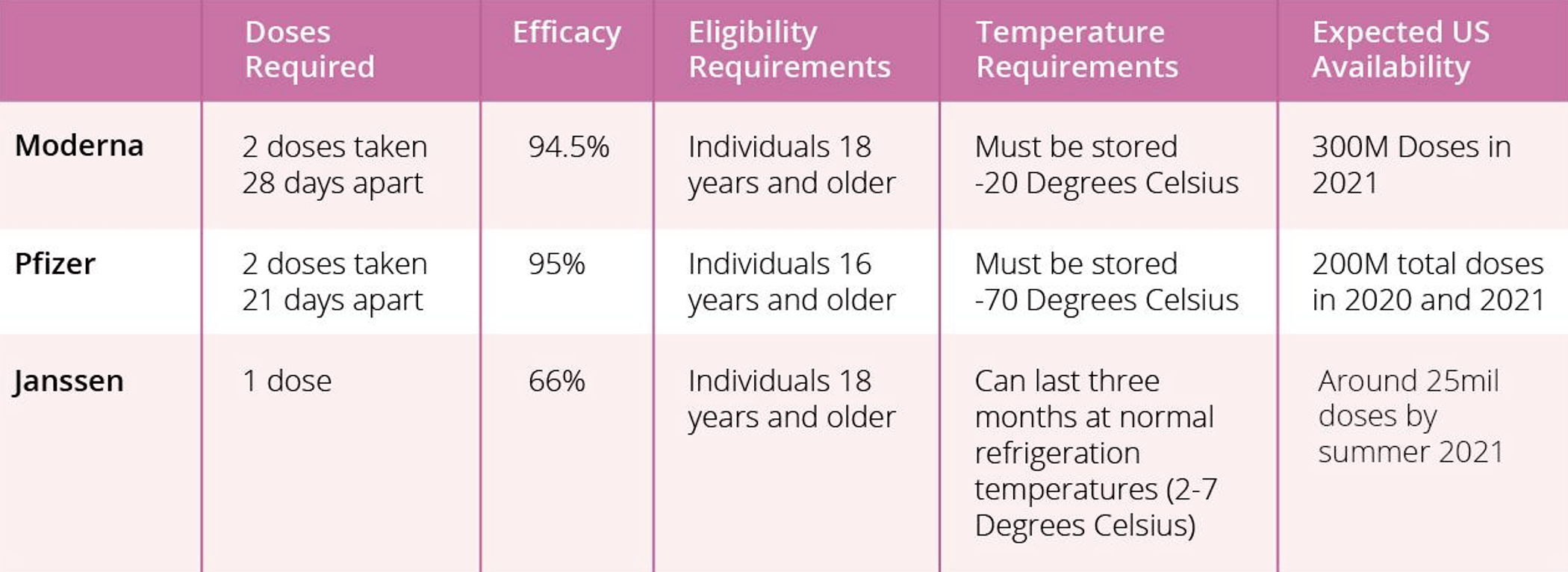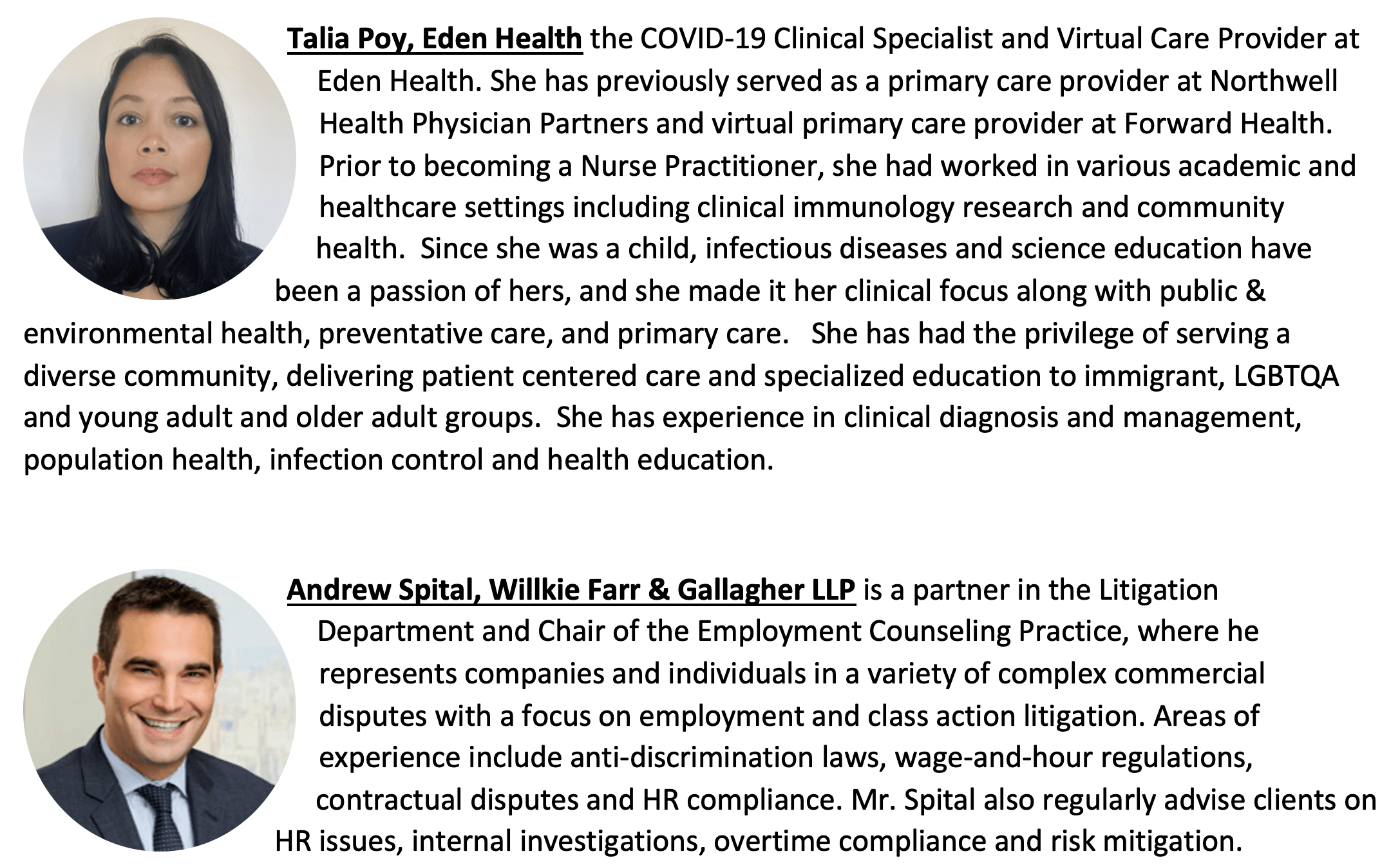Portfolio Roundtable Insights: COVID-19 Vaccinations and Return to Office

As more than 806 million COVID-19 vaccine doses have been administered worldwide, many companies are focused on how and when employees can safely return to the office (even if now in a hybrid capacity).
To help companies better understand the vaccines and what it means for their companies, we sat down with two experts: Talia Poy, a COVID-19 Clinical Specialist and Virtual Care Provider from Insight portfolio company, Eden Health, and Andrew Spital, an attorney at Willkie Farr & Gallagher LLP. Here are the insights that they shared with us:
What are the differences in the vaccines? Should companies be supplying that info to their employee base?
Poy at Eden: Your employees should get whichever vaccine is available to them once eligible. All of the authorized COVID-19 vaccines have been shown to significantly reduce the risk of serious illness from COVID-19. It is important to note that while there were differences in efficacy in a symptomatic or mild-to-moderate COVID-19 prevention, they all offer very high levels of protection against severe COVID-19. Vaccines are available globally, but the United States is currently only offering Moderna, Pfizer, and Johnson & Johnson.

When talking about the differences between the available vaccines, it’s important to not perpetuate misconceptions about varying efficacy levels between the vaccines. There were variations among protocols with varying endpoints, as well as differences in the prevalence of COVID cases while the efficacy levels were being tested for the three vaccines. Pfizer and Moderna’s vaccines were also tested before the emergence of troubling new variants. The only true comparison would be from a head-to-head study with all the vaccines, but due to the nature of the pandemic, that has not been possible as of yet.
As for the temporary pause on the Johnson & Johnson vaccine, the CDC’s Advisory Committee on Immunization Practices (ACIP) met on April 23 to continue evaluating the reports of a rare blood clot that developed in some people who received the vaccine. These cases have been extremely rare – only 15 individuals out of the 7.98 million people in the U.S. who received the vaccine have experienced these adverse events.
Therefore, the committee recommended that the CDC lift the temporary pause for all individuals 18 years and older. The advisory committee also recommended that the product insert include information about the rare risk of blood clots in recipients. You should still continue to encourage your employees to get whichever vaccine is available to them.
If your employees have a history of allergic reactions, are pregnant, or are immunocompromised, make sure they know to talk to their medical providers before receiving a vaccine.
The U.S. government has stated that everyone is eligible for the vaccine as of April 19. When can companies realistically expect all of their employees to be fully vaccinated?
Poy at Eden: There is a crucial distinction between eligibility and availability. Even though eligibility phases may have been lifted on April 19, we can anticipate that the supply will still be very limited. It typically takes the Defense Production Act around six months to see the impact, which would bring us to around June or July to see a significant increase in supply.
The important thing to do now is to manage employee expectations about when to expect widespread availability of the vaccine. Eligibility and availability vary by country. If your employees are working outside of the United States, they should check with local agencies to determine when they can get the vaccine and which ones they have access to.
How do you effectively communicate with your employees on how to get the vaccine?
Poy at Eden: When communicating with your employees on getting the vaccine, it’s important to stick to the facts and give them as many resources as possible to educate them on the vaccine options.
If you choose to deploy any kind of vaccination plan, you should have a strategy in place that encourages your employees to receive the vaccine as soon as they are able. This may look like offering a financial incentive for getting vaccinated or by giving them the full day off of work for vaccination days. Since known side effects of the vaccine prompt immune responses that may result in fever, body aches, general fatigue, and more, it may be comforting for employees to know that they are guaranteed paid sick leave should they feel ill after receiving the vaccine.
Once all of the above protocols are in place, it’s important to tell your workforce that they have been implemented. This provides not only valuable information for employee compliance, but also crucial peace of mind.
One of the greatest challenges of this pandemic is that so many aspects of the virus are still unknown. Rumors tend to grow in the absence of reliable information, so clear communication and transparency are vital right now. Create a communication plan that includes the following steps:
- Develop processes to reach all employees with important updates.
- Constantly reinforce work-from-home and travel guidelines, as well as mental, physical, and financial resources that are available.
- Take this opportunity to build trust with employees.
- Consider communicating using non-traditional methods. Email works, but consider all media at your disposal, including text outreach, voicemails, and even LinkedIn posts about your taskforce initiatives (this may also support local businesses).
- Remember that there is no such thing as overcommunication at this moment. Reassure your employees often that there is a plan in place with specific guidelines to govern returning to work.
Can employers require employees to take the vaccine?
Spital at Willkie Farr and Gallagher: Generally, yes, subject to some important limitations. As of now, the federal government has taken the position that federal law does not prevent employers from mandating the vaccine, so long as employers make reasonable accommodations for employees who cannot be vaccinated for medical or religious reasons. However, a number of states have proposed legislation that, if enacted, would prevent employers from mandating the vaccine. In addition, at least two lawsuits have been filed by government employees alleging that their employer’s vaccination requirement was unlawful, in part because the vaccine has not yet been formally approved by the FDA; rather, it is being distributed pursuant to an emergency-use authorization.
Nevertheless, the general consensus among employment lawyers is that employers may legally mandate the vaccine at this time, although the law may change, and regardless, employers who enforce a vaccine mandate may face legal challenges.
Are you seeing employers mandate the vaccine?
Spital at Willkie Farr and Gallagher: At this point, most companies have opted to encourage rather than require the vaccine. However, that may change as vaccinations become more widely available and if vaccines become mandatory in other settings. For example, several universities, including Brown, Cornell, Duke, and Rutgers, have announced that they will require all students to be vaccinated to return to school for the fall semester. Of course, it is difficult to predict whether vaccine status will start to play a role in daily life, and certain states, including Florida and Texas, have already taken steps to prevent certain businesses from requiring that their customers be vaccinated.
At this point, employers would be well advised to consult with counsel and to closely monitor any legislative developments applicable to their business regarding vaccines in the workplace as this is a rapidly evolving landscape. Employers should also stay current on what their peers are doing.
Can employers ask employees what their vaccine status is?
Spital at Willkie Farr and Gallagher: We get this question a lot, and it’s difficult to answer in the abstract. The short answer is yes; employers can ask their employees if they have been vaccinated, but they should not ask why an employee did not get vaccinated absent a true job-related business need for doing so, as that follow-up question could elicit confidential medical information.
As a general matter, we would caution against asking specific employees their vaccination status at all without a compelling reason, such as enforcing a mandatory vaccine policy or if there is a particular safety concern. That said, gathering information about your workforce’s vaccination status and/or attitudes towards the vaccine generally could be useful in developing a return-to-work plan, and companies can elicit such information in the context of broader return-to-work surveys with minimal risk where such surveys are truly anonymous and voluntary.
To the extent an employer does learn the vaccine status of specific employees, it should treat such information as confidential employee medical information under the Americans With Disabilities Act and other applicable privacy laws.
Overall, the vaccines are an exciting step towards a return to “normal,” but there are still many unknowns when it comes to COVID-19 – particularly as it relates to new variants and transmissibility once vaccinated. Globally, we are learning more every day, but the landscape is constantly evolving. Employers should continue to be flexible as they navigate a return to offices and understand that employees might have varying comfort levels based on their home situations. It is also important to continue to consult your employment lawyers as you establish your return-to-work plan.
One thing is certain: This year has been difficult and ambiguous for everyone. Yet, the software industry has been able to weather the COVID-19 storm and will continue to do so as we get closer to “normal.”
About the Experts










